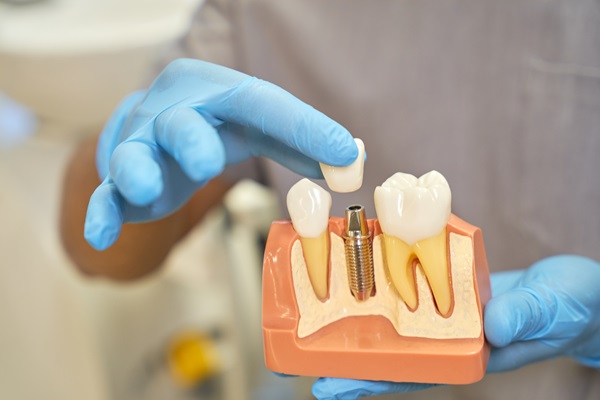10 Possible Side Effects of Getting Dental Implants

Whenever you have a missing tooth, one of the most common dental procedures you can opt for is dental implants. They offer numerous benefits, including improved appearance of your teeth, functionality, and oral health.
However, like any medical procedure, getting a dental implant may also come with certain side effects. What could these side effects be?
To give you an idea, the majority of these side effects are just temporary and resolve on their own. But for us at Blue Gum Dental, we think it’s still important to be informed about what to expect.
Let’s see what these 10 possible side effects are when you get dental implants and their impact on your health.
1. Swelling and Bruising After Surgery
One of the most common side effects of dental implants is swelling in the gums, jaw, or face. Swelling typically occurs after the surgery as your body heals from the procedure. You may also notice bruising around the implant area, which is a normal response to surgical intervention.
Swelling and bruising usually subside after a few days and can be managed with ice packs, anti-inflammatory medications, and rest. This side effect is typically temporary, and keep in mind to follow your dentist’s post-operative care instructions to ensure proper healing.
2. Pain or Discomfort
Experiencing pain or discomfort is your body’s natural response following your dental implant surgery. The thing is, the level of pain may vary depending on the complexity of the procedure and your individual pain tolerance. However, most patients report mild to moderate discomfort that gradually improves over a few days.
Pain may be managed with over-the-counter pain relievers or medications prescribed by your dentist.
3. Infection at the Implant Site
Infection at the implant site only happens in rare cases where an infection develops after the surgery. This happens when bacteria enter the area during or after the procedure, which may also affect the success of the operation.
Here are some signs of infection after the surgery:
- Persistent swelling
- Redness
- Fever
- Pain that doesn’t subside
If you notice any signs of infection, contact your dentist immediately.
4. Nerve Damage
In some cases, a dental implant may be placed too close to a nerve, which would lead to temporary or permanent nerve damage. If this happens, it may result in numbness, tingling, or pain in the lips, chin, or gums.
This complication happens very rarely but remains a possibility, especially when implants are placed in the lower jaw. So, make sure to inform your dentist whenever you’re faced with this scenario.
5. Sinus Issues
When you’re receiving dental implants in the upper jaw, there’s a small risk of developing sinus issues. This can occur if the implant protrudes into the sinus cavity, leading to discomfort, sinus infections, or pressure in the area.
Need not to worry because your dentist will carefully assess your bone structure and sinus position first during the planning phase to reduce this risk.
6. Gum Recession
Another potential side effect of dental implants is gum recession around the implant site. This happens when the gum tissue surrounding the implant may start to recede, which will expose part of the metal post. This recession may increase the risk of your gums getting infected.
7. Implant Failure
Implant failures may occur, but very rarely, particularly in patients with certain health conditions or habits. Some of the factors that increase the likelihood of infection from happening are when the patient has a habit of smoking, poor oral hygiene, and underlying health issues such as diabetes or autoimmune disorders.
8. Bone Loss
Over time, some patients may experience bone loss around the implant area. This occurs when the bone supporting the implant weakens or deteriorates, which can cause the implant to become loose or unstable.
Bone loss is more likely to happen if the implant is placed in an area with insufficient bone density or if the patient experiences ongoing infection.
9. Allergic Reactions
Although rare, there are also times when allergic reactions happen to patients who get dental implants — especially from materials like titanium or other metals. Some of the symptoms you should look out for are swelling, itching, or discomfort around the implant site.
If you have a known allergy to metals, be sure to inform your dentist before undergoing the procedure so they may recommend other materials for your safety and comfort.
10. Speech or Chewing Difficulties
After receiving a dental implant, some patients may experience temporary difficulties with speech or chewing. This is also a common side effect of dental implant surgery due to the adjustment period, as your mouth adapts to the presence of the new implant. Speech or chewing problems typically resolve as you become accustomed to the implant.
Knowing What to Expect
Patients who have missing teeth may find relief from getting dental implant surgery. And while this procedure has many benefits, it also comes with side effects that are typically temporary. However, there are still some cases where patients might experience rare scenarios after their procedures, and it’s best to learn what to expect.
Remember, if you experience any unusual symptoms or prolonged discomfort after getting a dental implant, don’t hesitate to contact your dentist for further evaluation and treatment.
At Blue Gum Dental, we prioritise your comfort and safety throughout the dental implant procedure. Contact us today to book a consultation and learn more about how dental implants can restore your smile and improve your quality of life.
